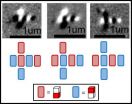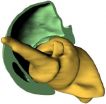A VIP for normal brain development
2011-07-02
(Press-News.org) A team of researchers — led by Pierre Gressens, at Inserm U676, Paris, France, and Vincent Lelièvre, at CNRS UPR-3212, Strasbourg, France — has identified a signaling pathway key for normal brain development in the mouse. Of paramount importance, the data generated suggest that environmental factors, including maternal ones, can influence the final size of the brain.
Individuals with microcephaly primary hereditary (MCPH) are born with a very small head and a small brain. They suffer mild developmental delay, hyperkinesia (excessive restlessness), and mild to severe cognitive impairment. Although mutation of any one of seven genes is known to cause MCPH, a lack of good animal models has made it hard to understand the underlying mechanisms. To gain insight into this, Gressens, Lelièvre, and colleagues used a mouse model in which microcephaly is induced by blocking the peptide VIP during gestation using a VIP antagonist (VA). Initial analysis indicated that prenatal administration of VA gives rise to brain abnormalities that mimic those observed in patients with MCPH. Further analysis identified a cellular and molecular mechanism for the observed abnormalities. The authors therefore conclude that the identified molecular pathway (the VIP/Mcph1/Chk1 pathway) is key for normal brain development and suggest that environmental factors disturbing this pathway can modulate the development of the brain as well as its final size.
INFORMATION:
TITLE: VIP blockade leads to microcephaly in mice via disruption of Mcph1-Chk1 signaling
AUTHOR CONTACT:
Pierre Gressens
Inserm U676, Hôpital Robert Debré, Paris, France.
Phone: 33.1.40.03.19.76; Fax: 33.1.40.03.19.95; E-mail: pierre.gressens@inserm.fr.
Vincent Lelièvre
CNRS UPR-3212, Université de Strasbourg, Strasbourg, France.
Phone: 33.3.88.45.66.59; Fax: 33.3.88.60.16.64; E-mail: lelievre@inci-cnrs.unistra.fr.
View this article at: http://www.jci.org/articles/view/43824?key=1236357151332f9ec680
END
ELSE PRESS RELEASES FROM THIS DATE:
2011-07-02
Parkinson disease (PD) affects 1-2% of the population over the age of 65 years. It results from loss or loss of function of nerve cells in the brain that coordinate movement. As a result, the hallmark symptoms of PD are trembling in hands, arms, legs, jaw, and face; stiffness of the limbs and trunk; slowness of movement; and impaired balance and coordination. There is no cure for PD, but symptoms can be alleviated with a variety of drugs. A team of researchers, led by Chung-Chin Kuo, at National Taiwan University College of Medicine, Taiwan, has now shown that pharmacological ...
2011-07-02
Novis Shoes can provide shoe lifts custom designed for individual customers who experience leg length discrepancy problems.
Our orthopedic footwear company specializes in all kinds of shoe modifications - from simple repairs to complete custom-made footwear - and can fill specific prescriptions quickly and easily.
Our skilled Certified Pedorthist can apply shoe lifts for just about any shoe - for heights of 1/4 of an inch to six inches. Leg length discrepancy can be caused by a number of congenital and acquired conditions, including hip surgery, scoliosis, hip disease, ...
2011-07-02
EDITOR'S PICK: A VIP for normal brain development
A team of researchers — led by Pierre Gressens, at Inserm U676, Paris, France, and Vincent Lelièvre, at CNRS UPR-3212, Strasbourg, France — has identified a signaling pathway key for normal brain development in the mouse. Of paramount importance, the data generated suggest that environmental factors, including maternal ones, can influence the final size of the brain.
Individuals with microcephaly primary hereditary (MCPH) are born with a very small head and a small brain. They suffer mild developmental delay, hyperkinesia ...
2011-07-02
Infection with the gastric bacterium Helicobacter pylori provides reliable protection against allergy-induced asthma, immunologists from the University of Zurich have demonstrated in an animal model together with allergy specialists from the University Medical Center of the Johannes Gutenberg University Mainz. Their results published in the prestigious Journal of Clinical Investigation confirm the hypothesis recently put forward that the dramatic increase in allergic diseases in industrial societies is linked to the rapid disappearance of specific micro-organisms that populate ...
2011-07-02
On the heels of the runaway success of the hit song "Friday," Ark Music Factory has partnered with ABC-TV's Good Morning America to find and develop America's next viral music star. And Tuesday morning, June 28, GMA will reveal her: Lexi St. George. Good Morning America started a series of stories on the talent search and development June 27; it will host the world premiere of Lexi's debut music video, "Dancing to the Rhythm," on Thursday, June 30 (check local listings for stations and air times). The video will also be featured on Ark Music Factory's ...
2011-07-02
KINGSTON, R.I. – July 1, 2011 – Tiny marine organisms called zooplankton can use specialized adaptations that allow them to hide from predators in areas of the ocean where oxygen levels are so low that almost nothing can survive, but they may run into trouble as these areas expand due to climate change.
"Oxygen minimum zones are very difficult places to survive," said University of Rhode Island doctoral student Leanne Elder. "But we have discovered that these tiny animals have adapted in two specialized ways. First, they suppress their metabolism, which is very much ...
2011-07-02
Future computers may rely on magnetic microprocessors that consume the least amount of energy allowed by the laws of physics, according to an analysis by University of California, Berkeley, electrical engineers.
Today's silicon-based microprocessor chips rely on electric currents, or moving electrons, that generate a lot of waste heat. But microprocessors employing nanometer-sized bar magnets – like tiny refrigerator magnets – for memory, logic and switching operations theoretically would require no moving electrons.
Such chips would dissipate only 18 millielectron ...
2011-07-02
A study published by the University of Reading's Centre for Agri Environmental Research suggests that honeybees may not be as important to pollination services in the UK than previously supposed. The research was published in the Journal Agriculture, Ecosystems and Environment.
"Pollination services are vital to agricultural productivity in the UK" says lead author Tom Breeze "as of 2007, 20% of the UK's cropland was covered by insect pollinated crops like oilseed rape and apples. For decades now we have assumed that honeybees have been providing the majority of pollination ...
2011-07-02
Winning margins in the Tour de France can be tight – last year just 39 seconds separated the top two riders after more than 90 hours in the saddle. When every second counts, riders do everything possible to gain a competitive advantage – from using aerodynamic carbon fibre bikes to the very latest in sports nutrition.
Now there could be a new, completely legal and rather surprising weapon in the armoury for riders aiming to shave vital seconds off their time – beetroot juice.
Research by the University of Exeter, published in the journal Medicine and Science in Sports ...
2011-07-02
A musculoskeletal system so far unknown in the animal world was recently discovered in weevils. The hip of Trigonopterus oblongus does not consist of the usual hinges, but of joints based on a screw-and-nut system. This first biological screw thread is about half a millimeter in size and was studied in detail using synchrotron radiation. The discovery is reported by the current issue of the Science magazine. (DOI:10.1126/science.1204245)
"Such a construction for animal leg movement is quite unusual, as large areas of skeletal parts move on top of each other. Supply ...
LAST 30 PRESS RELEASES:
[Press-News.org] A VIP for normal brain development



